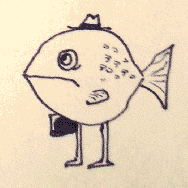And by mermaid science there's no real explanation as to why they can breathe both air and water, because mermaids study ... well, they do study biology, but mostly in the categorical sense. Mermaids have a deep and abiding love for taxonomy. However, they have very different names for everything under the sea. It wouldn't be hard to name things differently from human beings – we tend to name things after ourselves. Mermaids have this habit, too, but they usually forget and rename those things until arriving at a suitably descriptive moniker that any mermaid would arrive at after sufficient reflection. Plus everything they name is in the mermaid equivalent scientifically bastardized Greek or Latin, and you don't need me to tell you how many levels of incomprehensibility that has even for mermaids.‡
Now, back to the matter at hand – one of the heretofore unnoticed marvels of the mermaid sociopulmonary system is that mermaids can rapidly adapt to pressure variations without suffering adverse affects such as human beings do. The bends, for example, aren't a big problem for mermaids. They race up and down the water column – to harass sailors, chase squid, who knows – and they don't have to worry about taking it easy like SCUBA divers other landed seafarers.
It is important to note, however, that this is a feature of the mermaid's aforementioned sociopulmonary system. By some fatal quirk of evolution, whatever it is that makes mermaids such resilient breathers is intimately connected to their neural passages. It's not to say they're sensitive – quite the opposite, in fact, they have very robust egos – but more that they're inattentive. The ability to adapt to rapidly changing environments (be they social or physical), predisposes the mermaid to immerse him or herself in rapidly changing environments. Mermaids get bored easily, so they go off and harass sailors.
Resilient though they are, if a mermaid is particularly overwhelmed, they have panic attacks and hyperventilate. It's much more common than in human beings, since our sociopulmonary systems aren't as well developed. It's even widespread in some populations of mermaid. These groups resemble myotonic goats, inasmuch as the condition is nonlethal, but hilarious.
High school, due to these highly advanced sociopulmonary systems, is more boring than it is difficult for the mermaid teenager. As they can resist high levels of pressure, most activities are engaged in entirely of the mermaid's own volition, and there are very low levels of crushing, burdenous angst. Merteachers have instituted several periods of daily recess through all levels of education, as much for themselves as the students – even in the great schools of higher mer-learning, biologians and thermodynamiticians still have recess when they're at the lab. Otherwise everyone would go nuts.
This accounts for many research stations being located in those rare spots where one can find both lots of dolphins and lots of sailors. You'd think mermaids would make fun of nerds, but since they all have such high self-esteem it doesn't really work. Octopus, on the other hand, are very easy to make fun of, so Tom Armalast** is easily the angriest and most ridiculed guy at the lab, even if he is really smart. He'd quit, but you just don't find the same opportunities back in octopus society. Octopus are cutthroat.

* I'm so awesome.
† Okay, maybe not the teeth.
‡ One of those languages is called Bloop, I think. Or well – Ancient Bloop. Spoken by the long-dead Bloops, Ancient Bloop bears little resemblance to Modern Bloop, except that they share a certain number of cases and tones you don't find in contemporary languages (Gurple, for example).
** No one bothered to learn his Octopus name; they would have made fun of it anyway.

No comments:
Post a Comment